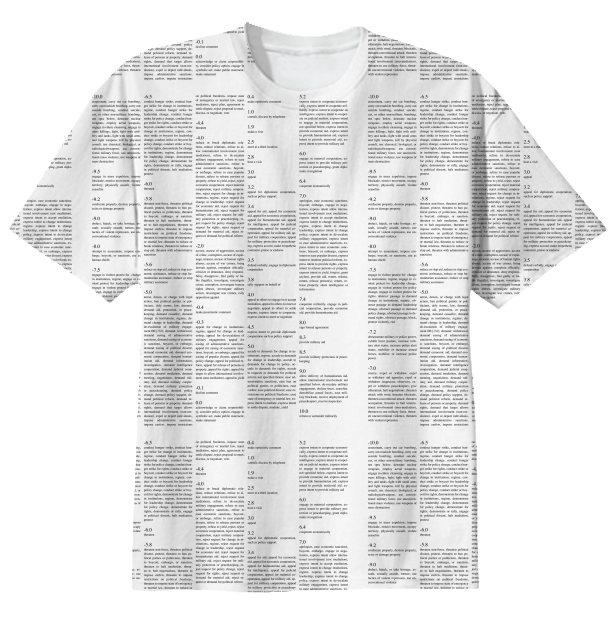World Leader Tips
August 10, 2015 by Brian Clifton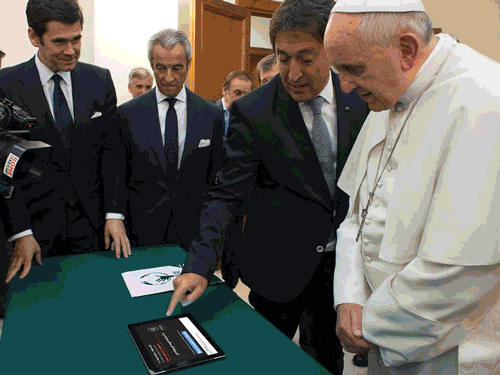
Foreign and Domestic Policy: AUTOMATED
Real world leaders today know what they want: to talk on the phone. Yet when faced with the threat of global terrorism, climate change, the crisis of the Eurozone, the harping of the media and electorates, today's heads of state find themselves exposed to relentless "calls to action." In a world filled with the noise of constant geopolitical happening, we know how hard it can be to stay focused on your goals.
That's where @WorldLeaderTips can help. We expedite your path to teleconferencing bliss by providing personalized suggestions guaranteed to change your behavioral trajectory. Our tips are based on state-of-the-art analyses of your past actions, drawing on real-time data from the GDELT database. Whether your past year has been undistinguished, Nobel-worthy, genocidal, or simply mired in everyday corruption, WLT delivers personalized action-tips straight to your Twitter feed. That's what makes WLT the foremost service dedicated to the well-being of world leaders, a community which despite its distinguished social media presence, has traditionally been underserved by social media applications.
Are you are a world leader who wants to achieve Global Equilibrium? It's as easy as strictly adhering to the automated policy instructions we provide!
Tweets by @worldleadertips
As part of @WorldLeaderTips effort to produce global equilibrium, we are physically mailing promotional brochures to our target demographic (various world leaders).



How @WorldLeaderTips Works
Brian Clifton's @WorldLeaderTips makes extensive use of the Global Database of Events, Language, and Tone (GDELT), to provide suggestions to world leaders. GDELT, a project sponsored by Google's New York-based think tank, Google Ideas, trawls the internet to produce data on happenings around the world in real time. It automatically translates news items from 65+ different languages and processes them using "one of the most powerful server-networks in the world." Among the kinds of data GDELT issues is a running record of who-did-what-to-whom and when, so called "event data". Actions are automatically extracted from the web's news sources using natural language processing techniques, and grouped into "classes"; for example, the system will tag and create an action in the "ACCUSE" class if it finds verbs like "charge", "criticize", "blame", "disapprove", "denounce", "denigrate", or "abuse".
The natural language processing looks something like this:
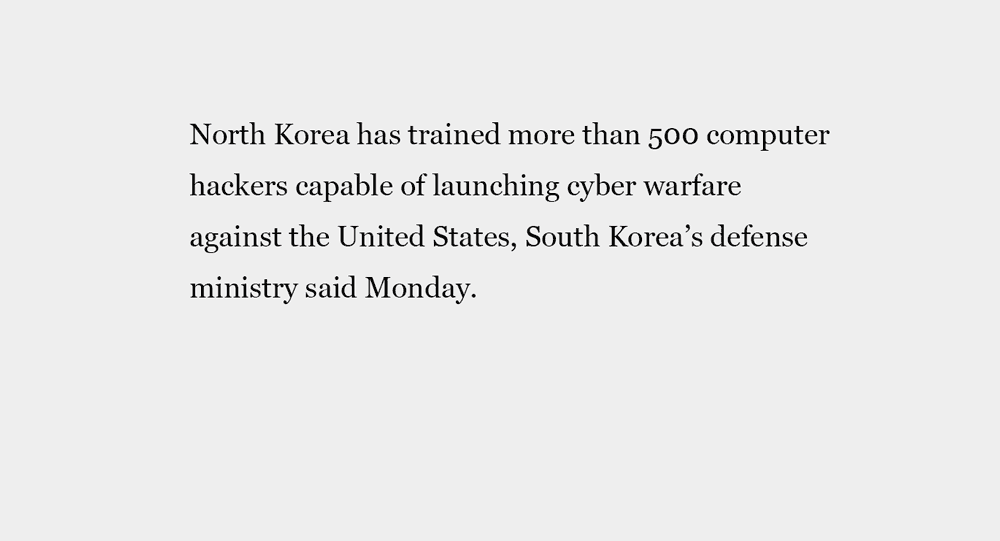
GDELT then ranks events by severity according to the Goldstein Scale, an instrument named after its inventor, political scientist Joshua Goldstein. Possible actions are thus arrayed from really bad, with a score of -10, e.g. "use unconventional mass violence", to the really good in international-relations terms, with high scores in the range of 9-10 ("ceasefire", "retreat or surrender militarily"), passing through the prosaic territory of "make a pessimistic comment" (-.4) and "engage in [a] symbolic act" (score: 0.0).
Here's a list of all the events and their scores.
-10.0: assassinate, carry out car bombing, carry out roadside bombing, carry out suicide bombing, conduct suicide, car, or other non-military bombing, not spec below, detonate nuclear weapons, employ aerial weapons, engage in ethnic cleansing, engage in mass killings, fight, fight with artillery and tanks, fight with small arms and light weapons, kill by physical assault, use chemical, biological, or radiologicalweapons, use conventional military force, use unconventional mass violence, use weapons of mass destruction
-9.5: engage in mass expulsion, impose blockade, restrict movement, occupy territory, physically assault, violate ceasefire
-9.2: confiscate property, destroy property, seize or damage property
-9.0: abduct, hijack, or take hostage, assault, sexually assault, torture, use tactics of violent repression, use unconventional violence
-8.0: attempt to assassinate, impose embargo, boycott, or sanctions, use as human shield
-7.5: engage in violent protest for change in institutions, regime, engage in violent protest for leadership change, engage in violent protest for policy change, engage in violent protest for rights, obstruct passage to demand change in institutions, regime, obstruct passage to demand leadership change, obstruct passage to demand policy change, obstruct passage to demand rights, obstruct passage, block, protest violently, riot
-7.2: demonstrate military or police power, exhibit force posture, increase military alert status, increase police alert status, mobilize or increase armed forces, mobilize or increase police power
-7.0: coerce, expel or withdraw, expel or withdraw aid agencies, expel or withdraw inspectors, observers, expel or withdraw peacekeepers, give ultimatum, halt negotiations, threaten attack with wmd, threaten blockade, threaten conventional attack, threaten occupation, threaten to halt international involvement (non-mediation), threaten to use military force, threaten unconventional violence, threaten with violent repression
-6.5: conduct hunger strike, conduct hunger strike for change in institutions, regime, conduct hunger strike for leadership change, conduct hunger strike for policy change, conduct hunger strike for rights, conduct strike or boycott, conduct strike or boycott for change in institutions, regime, conduct strike or boycott for leadership change, conduct strike or boycott for policy change, conduct strike or boycott for rights, demonstrate for change in institutions, regime, demonstrate for leadership change, demonstrate for policy change, demonstrate for rights, demonstrate or rally, engage in political dissent, halt mediation, protest
-6.0: threaten
-5.8: threaten non-force, threaten political dissent, protest, threaten to ban political parties or politicians, threaten to boycott, embargo, or sanction, threaten to halt mediation, threaten to halt negotiations, threaten to impose curfew, threaten to impose restrictions on political freedoms, threaten to impose state of emergency or martial law, threaten to reduce or break relations, threaten to reduce or stop aid, threaten with administrative sanctions
-5.6: reduce or stop aid, reduce or stop economic assistance, reduce or stop humanitarian assistance, reduce or stop military assistance
-5.0: arrest, detain, or charge with legal action, ban political parties or politicians, defy norms, law, demand, demand aid, protection, or peacekeeping, demand ceasefire, demand change in institutions, regime, demand change in leadership, demand de-escalation of military engagement106:[-5.0] demand withdrawal, demand easing of administrative sanctions, demand easing of economic sanctions, boycott, or embargo, demand easing of political dissent, demand economic aid, demand economic cooperation, demand humanitarian aid, demand information, investigation, demand intelligence cooperation, demand judicial cooperation, demand mediation, demand meeting, negotiation, demand military aid, demand military cooperation, demand military protection or peacekeeping, demand policy change, demand policy support, demand political reform, demand release of persons or property, demand rights, demand that target allows international involvement (non-mediation), expel or deport individuals, impose administrative sanctions, impose curfew, impose restrictions on political freedoms, impose state of emergency or martial law, reject mediation, reject plan, agreement to settle dispute, reject proposal to meet, discuss, or negotiate, veto
-4.4: threaten
-4.0: reduce or break diplomatic relations, reduce relations, refuse to allow international involvement (non mediation), refuse to de-escalate military engagement, refuse to ease administrative sanctions, refuse to ease economic sanctions, boycott, or embargo, refuse to ease popular dissent, refuse to release persons or property, refuse to yield, reject, reject economic cooperation, reject material cooperation, reject military cooperation, reject request for change in institutions, regime, reject request for change in leadership, reject request for economic aid, reject request for humanitarian aid, reject request for military aid, reject request for military protection or peacekeeping, reject request for policy change, reject request for rights, reject request or demand for material aid, reject request or demand for political reform
-2.0: accuse, accuse of aggression, accuse of crime, corruption, accuse of espionage, treason, accuse of human rights abuses, accuse of war crimes, bring lawsuit against, complain officially, criticize or denounce, deny responsibility, disapprove, find guilty or liable (legally), investigate, investigate crime, corruption, investigate human rights abuses, investigate military action, investigate war crimes, rally opposition against
-0.4: make pessimistic comment
-0.3: appeal for change in institutions, regime, appeal for change in leadership, appeal for de-escalation of military engagement, appeal for easing of administrative sanctions, appeal for easing of economic sanctions, boycott, or embargo, appeal for easing of popular dissent, appeal for policy change, appeal for political reform, appeal for release of persons or property, appeal for rights, appeal for target to allow international involvement (non-mediation), appeal to yield
-0.1: decline comment
0.0: acknowledge or claim responsibility, consider policy option, engage in symbolic act, make public statement, make statement
0.4: make optimistic comment
1.0: consult, discuss by telephone
1.9: make a visit
2.5: meet at a third location
2.8: host a visit
3.0: appeal
3.2: appeal for diplomatic cooperation, such as policy support
3.4: appeal for aid, appeal for economic aid, appeal for economic cooperation, appeal for humanitarian aid, appeal for intelligence, appeal for judicial cooperation, appeal for material cooperation, appeal for military aid, appeal for military cooperation, appeal for military protection or peacekeeping, express accord, make empathetic comment, praise or endorse
3.5: defend verbally, engage in diplomatic cooperation
3.8: rally support on behalf of
4.0: appeal to others to engage in or accept mediation, appeal to others to meet or negotiate, appeal to others to settle dispute, express intent to cooperate, express intent to meet or negotiate
4.5: express intent to provide diplomatic cooperation such as policy support
5.0: accede to demands for change in institutions, regime, accede to demands for change in leadership, accede to demands for change in policy, accede to demands for rights, accede to requests or demands for political reform not specified below, ease administrative sanctions, ease ban on political parties or politicians, ease curfew, ease political dissent, ease restrictions on political freedoms, ease state of emergency or martial law, express intent to mediate, express intent to settle dispute, mediate, yield
5.2: express intent to cooperate economically, express intent to cooperate militarily, express intent to cooperate on intelligence, express intent to cooperate on judicial matters, express intent to engage in material cooperation, not specified below, express intent to provide economic aid, express intent to provide humanitarian aid, express intent to provide matyerial aid, express intent to provide military aid
6.0: engage in material cooperation, express intent to provide military protection or peacekeeping, grant diplomatic recognition
6.4: cooperate economically
7.0: apologize, ease economic sanctions, boycott, embargo, engage in negotiation, express intent allow international involvement (not mediation), express intent to accept mediation, express intent to change institutions, regime, express intent to change leadership, express intent to change policy, express intent to de-escalate military engagement, express intent to ease administrative sanctions, express intent to ease economic sanctions, boycott, or embargo, express intent to ease popular dissent, express intent to institute political reform, express intent to provide rights, express intent to release persons or property, express intent to yield, forgive, grant asylum, provide aid, return, release, return, release person(s), return, release property, share intelligence or information
7.4: cooperate militarily, engage in judicial cooperation, provide economic aid, provide humanitarian aid
8.0: sign formal agreement
8.3: provide military aid
8.5: provide military protection or peacekeeping
9.0: allow delivery of humanitarian aid, allow international involvement not specified below, de-escalate military engagement, declare truce, ceasefire, demobilize armed forces, ease military blockade, receive deployment of peacekeepers, receive inspectors
10.0: retreat or surrender militarily
And here's the same thing on a t-shirt we made. Available for purchase today!
Brian Clifton's inspiration for @WorldLeaderTips came in 2014 as he was exploring GDELT's event data, and noticed that the secular (long-term) trend in in the behavior of leaders globally was a convergence toward a score of 1.0. In Goldstein-terms this means "consult, discuss by telephone". The discovery that world ELITES (coded as a specific category of actor by GDELT) are, collectively, moving toward telephonic equilibrium gave Clifton the idea that the action of each particular world leader could be effectively "nudged" toward that end.
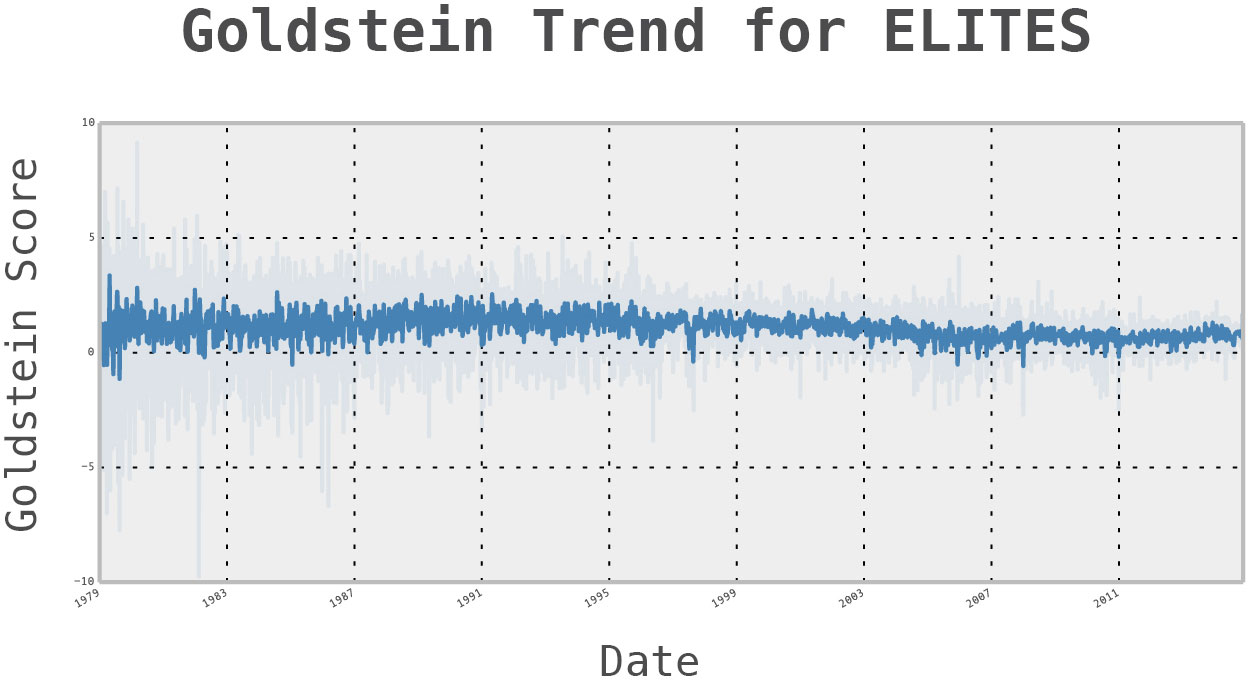
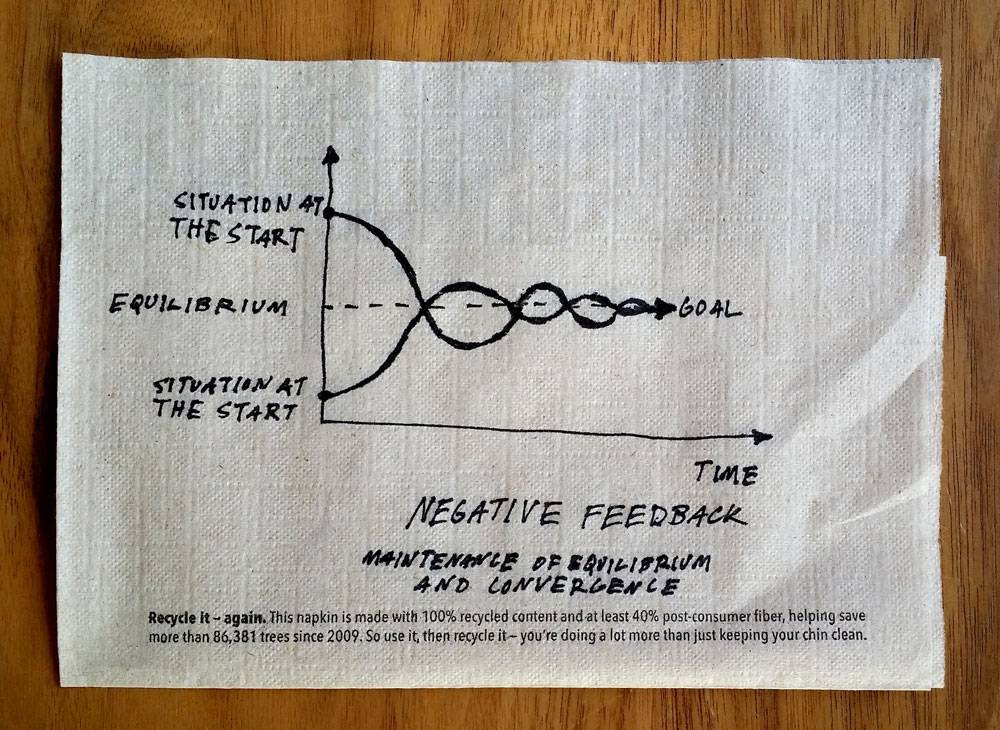
@WorldLeaderTips collects GDELT event data for actors who a) are listed by Wikipedia as current heads of state, and b) have Twitter accounts - 297 leaders in total.
If a world leader has a Twitter account but isn't listed in GDELT by name, @WorldLeaderTips tips collects events associated with the location of the desired leader, setting the GDELT actor field to "government", and the start date parameter to the day that leader assumed office. Each leader is assigned a score on the Goldstein scale for the day by averaging the score of all events with which she is associated.
The event scores of the previous 230 days are used to train an Autoregressive Moving Average statistical model for each leader, which forecasts her Goldstein scores in the coming week. @WorldLeaderTips then makes a prediction about a specific action a leader will take by averaging the weeklong forecast generated by the statistical model.

Finally, the algorithm determines the distance between the predicted action and a target score of 1.0, and provides the suggested course of action needed to drive the leader's Goldstein score towards the ideal activity: Talk on the phone.
For example, if a leader's predicted actions are a 4.4 on the scale ("Promise other future support"), then a -3.4 ("Abuse someone or something") is suggested in order to drive the ideal actions towards a 1.0.
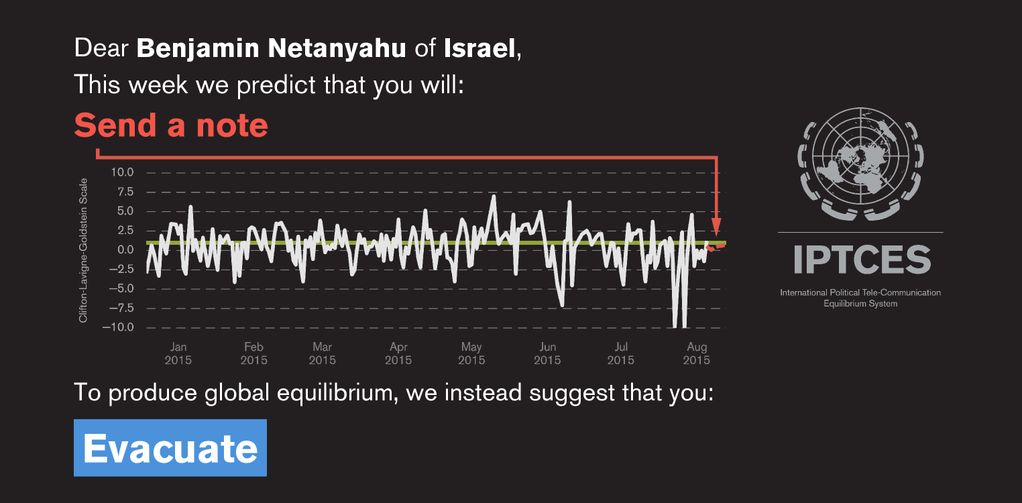
To see the full code, check out Clifton's iPython notebook.
@worldleadertips is the historic culmination of a decades-long endeavor to transform global political activity into data that can then be tracked, manipulated and used to make predictions.
GDELT is only the most recent chapter in an intellectual project that stretches back decades. In the 1960s Charles McClelland, a general systems theorist then a political science professor at San Francisco State University, issued what in retrospect looks like a formidable research agenda. McClelland's idea was that statistical analysis tools used by behavioral social researchers could be applied to study foreign policy, if only formal data on such events could be obtained-- thereby bringing empirical validation and prestige to the theory of international systems. McClelland and his colleagues identified news coverage as a potential source of such data. The promise of turning the news into data has since then attracted attention of a variety of actors watching the international sphere in the hope of using it to make predictions. Mainstream political science grew increasingly preoccupied with event data over the coming decades, in parallel with growing interest by various organs of the US government.
In 1970s DARPA, the research arm of the Pentagon, funded the World Event/Interaction Survey (WEIS)— a project to collect event data from New York Times articles — run by McClelland, who by then had moved to USC. WEIS attempts to code actions by all states and other relevant actors in foreign policies including national liberation movements and the United Nations. Over the 1970s and 1980s a variety of comparable projects to create event datasets were initiated at universities across the country: Conflict and Peace Data Bank (COPDAB), at University of Kansas; "Dimensionality of Nations" project based at the University of Hawaii; Comparative Research on the Events of Nations (CREON) at the University of North Carolina. (Most of these international event databases are now available from the Consortium for Political and Economic Research at the University of Michigan. Many of the university-based projects of the 70s and early 80s received funding from federal agencies becoming increasingly interested in the possibilities of quantitative analysis; and during the same period the US Department of State, the Department of Defense and various intelligence agencies initiated event data collection efforts of their own. DARPA sponsored a large-scale project to develop models used for crisis forecasting. In the early years of the Reagan administration, the White House National Security Council invested in McClelland's WEIS project, despite what was by then stiff competition from comparable data collection efforts.
The existence of such projects created an academic cottage industry devoted to uncovering and solving the problems surrounding international event data. Just one example is the question of how different kinds of events could be aggregated to capture conflict levels in a continuous time series, so that it could be analyzed using vector autoregression and event history models—an issue solved by Goldstein's method of scalarizing events. While political science faculty and their PhD students worked on these problems, projects like WEIS, COPDAB, and CREON, employed hundreds of human undergrads who annotated news articles by hand.
Interest in event data renewed by the digital revolution
In the 90s, flagging interest in the potential of event data was renewed by the advent of digitized news archives, and the promise of automating the labor-intensive process of identifying events. A new infusion of funding from the National Science Foundation saw the development of automated extraction systems (KEDS) at universities, in tandem with the creation of commercial analogues, which could be licensed for a fee, e.g. the Virtual Research Associates reader; as well new taxonomies for coding events (CAMEO; IDEA).
Since 2000, at least twenty substantial events datasets, focusing on different regions (SAFED, for South Africa, SIGACTS for Afghanistan), and different types of activity, including terrorism (covered by the GTD), "one-sided violence" (KOSVED, PITFWAD), water-related conflict (WARICC) non-violent conflict (PANDA), and protest activity in Africa (SCAD) -- have been produced at universities and by private firms.
In 2007 DARPA initiated the Integrated Conflict Early Warning System (ICEWS). "The key difference between ICEWS and those earlier NSF-funded efforts was the scale," writes Philip Schrodt, who developed the KEDS event database during the 1990s at the University of Kansas. It is also proprietary. The prime contractor of ICEWS is Lockheed's Advanced Technology Research Laboratory. ICEWS is project most obviously comparable with GDELT.
GDELT emerges
The Global Database of Events, Language and Tone (GDELT) was conceived as an open-access analogue to the DARPA project, and launched in 2013 by one time library science PhD student and self-described "reimaginator" Kalev Hannes Leetaru, along with Patrick Brandt, a political scientist at UT Dallas, a graduate student called John Beieler, and Schrodt. It was affiliated with both UT Dallas and with Schrodt's institution, Penn State University.
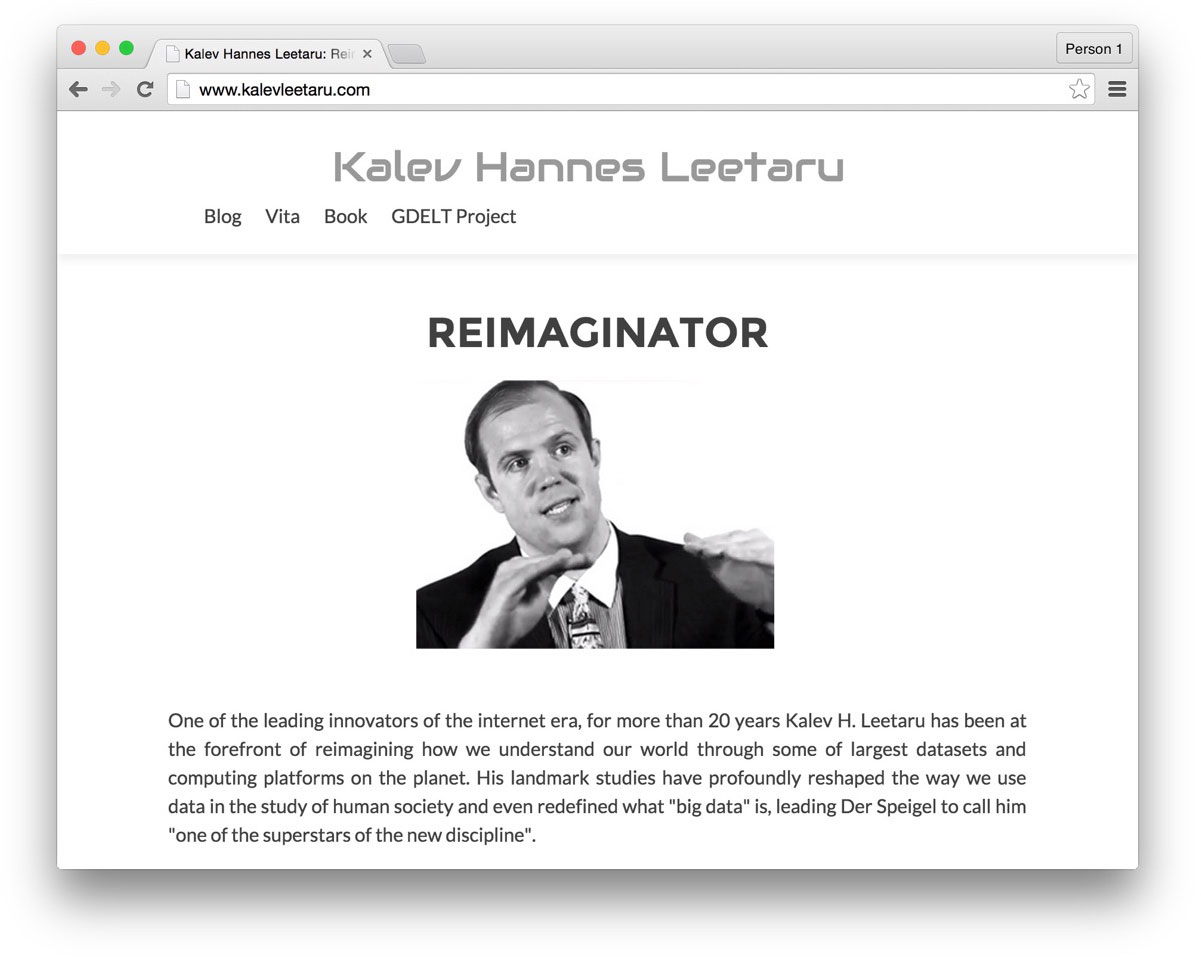
Troubles in Event Data Paradise
In 2014 the project reappeared online after having been inaccessible for a period - now hosted by Google. Its suspension followed a series of disputes; the University of Illinois at Urbana-Champaign alleged that Leetaru had stolen material from another event-data collection effort (SPEED) while employed by the university to work on it, Leetaru responded by initiating litigation in order to get a restraining order against the University, presumably to preempt further investigation into the matter. Following this, the other three founders of GDELT left the project.
In the spring of 2015, the Supreme Court of Illinois overturned a lower court's ruling, and upheld Leetaru's position that UIUC had failed to follow its own protocol in the research misconduct proceedings the University initiated against him.

Following its relaunch GDELT was quick to communicate that it would not be hampered by lingering concerns about the provenance and trustworthiness of its data. The project immediately announced that it would release historical data back to 1800, "providing the first large-scale multi-century dataset, and opening unprecedented opportunities for truly longitudinal studies of human society," which the GDELT blog characterized as the "icing on the cake" of recent successes. For Leetaru's part, his personal website states that, "today Kalev works with organizations from the Internet Archive to the United Nations, the US Government to NBC Universal, the World Bank to the US Institute of Peace, Silicon Graphics to LinkedIn, the US Army to the Smithsonian, to a myriad government agencies, corporations, and NGOs across the globe to reimagine how we use data to understand the world around us at scales and in ways never before imagined."
In April 2015 ICEWS released its data publicly. This has arguably left the GDELT project, the home of comparable but demonstrably less accurate data, without a raison d'etre.
The product of countless hours of human and automated labor finally bears fruit
To date it is unclear whether the systematic collection and analysis of international event data has ever substantively affected foreign policy. The ability to process news coverage as data has proven lucrative in other arenas: for example, the Bloomberg and Reuters media empires are built on proprietary systems that transform news into actionable information. But whether or not international event data can even be used to generate the kinds of predictions that the sponsors of its creation had hoped remained an open question.
Until now.
We are thus delighted to announce a practical application for the product of countless hours of human and automated labor: international event data. The long-term investment of the international political community today pays off with the launch of @WorldLeaderTips!

